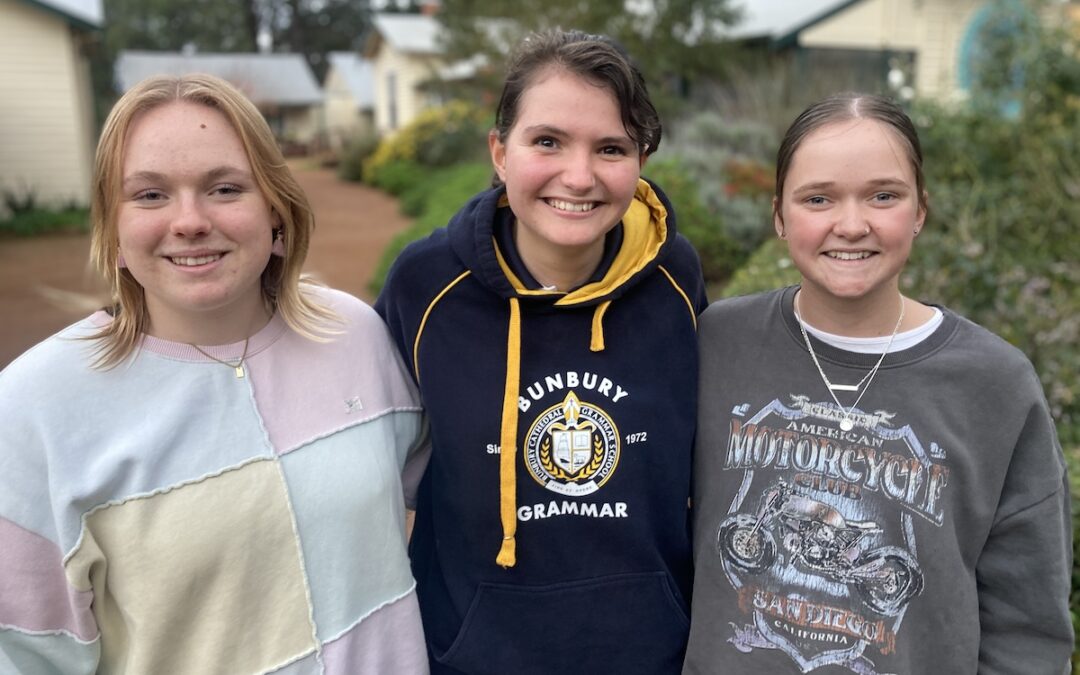A group of young environmental champions is running a series of beach clean-ups – with the collected rubbish to be used in a new art project.
Locals Ruth Szandtner, Bronte Halden, Lili Palmer, Vivi Corteen-Hartley and Riley Hughes are among 12 candidates in Nature Conservation Margaret River Region’s youth marine stewardship program. It’s backed by the World Surf League’s grants program and the Line In The Sand philanthropic group, and aims to empower our next generation to run meaningful coastal conservation programs.
The quintet has formed an initiative called Protect The Tides, focussed on reducing and raising awareness about marine debris and its impacts on our ocean and marine wildlife.
They have organised school holiday community beach clean-ups to be held at Flinders Bay in Augusta on Monday, July 8 from 1pm-2pm and at Ellensbrook Beach on Thursday, July 11, also from 1pm-2pm. Everyone is welcome and the community is urged to turn out and lend a hand.
The collected rubbish will be used for an education and awareness-raising campaign at Augusta Primary School, with students using the debris to create ocean-inspired artworks which will be exhibited at the Margaret River HEART. The public will choose their favourite work of art, with the winning artist to receive two free whale-watching tickets from Cape Naturaliste Charters.
In addition to the two beach clean-up days, Ruth – who attends Bunbury Cathedral Grammar School – has also organised another beach clean-up in the Bunbury area with her school community, widening the impact of the project across the South-West.
“I was walking on the beach in Augusta with my parents and sister recently, and the amount of washed-up rubbish we found was terrible,” says Bronte. “We found almost 600 items in one hour at Quarry Bay. You might think throwing away a piece of rubbish isn’t that bad, but it can wash up on a shore anywhere in the world.”
Ruth says all that rubbish is taking a toll on marine life. “Researchers are finding birds with their bellies entirely full of plastic,” she says. “Hearing about that made me realise the severity of plastic of our marine life. It’s so sad. That’s why I want to act for the environment, pick up plastic and make a difference.”
Lili added: “So many of us have a passion for the ocean and the beach – it’s such a great resource, but not if we ruin it. This is a way to give back. If you want to make a difference, join us at Flinders Bay and Ellensbrook and lend a hand at the beach clean-ups. We’d love to see you there!”
Nature Conservation’s youth marine stewardship program involves young people aged 15-18 with a keen interest in the ocean. They have already attended a series of workshops linked to the marine world but covering leadership, mental health, indigenous culture, freediving, reading the coastline and coastal conservation. Now, they are developing and running their own conservation projects.
Program coordinator Mandy Polley says the passion and enthusiasm of the Protect The Tides crew is an inspiration.
“The beach clean-ups are a real, hands-on way to get involved with caring for our coastline. But the beauty of this project is that the benefits flow on in other ways too,” says Mandy.
“That’s because the data about the collected rubbish will be entered into the Tangaroa Blue Australian Marine Debris Initiative database, which aims to find solutions to stop the flow of rubbish into our precious oceans. Plus, by using marine debris to make art, the Augusta Primary students will also learn about the impact and volume of rubbish on our oceans.”
If you are attending the beach clean-ups, please register your attendance, and bring water and sun protection. Gloves and bags for rubbish will be supplied, as well as free afternoon tea. Meet at Flinders Bay car park on July 8 and at the Ellensbrook Beach car park on July 11.
“If you can’t make it on the day, try your best to pick up one piece of rubbish every time you visit the beach. You might not think it makes a difference, but if a million people did it, that’s a million pieces of rubbish,” says Bronte.

